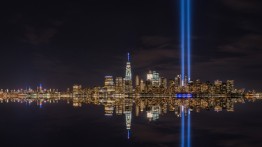COOPERMADE: Tribute in Light

Before September 11, 2001, the Twin Towers was a controversial project. Critics saw it as a behemoth overpowering its lower Manhattan neighborhood. Others decried its undistinguished architecture. But all agreed that the site was first and foremost a way finder that oriented residents and tourists alike on their journeys through the city. When designing their Tribute in Light—two light beams extending 4 miles upward from the original site of the Twin Towers—the artist Julian LaVerdiere A’93 and his colleague Paul Myoda understood that aspect of the site. At the same time their elegant memorial, initially mounted six months after the attack as a temporary tribute, demonstrates how the physical landmark has given way to a metaphoric one freighted with meaning.
Myoda and LaVerdiere were initially challenged by the prospect of submitting their proposal for a Twin Towers memorial. They had been members of a residency program for artists with studios on the 91st floor of the World Trade Center, and the losses of that day had been overwhelming and deeply personal. However, they realized that they still felt the presence of the Towers and thought that recreating them as ghostly auras of light felt fitting. “The big lighting rigs surrounding the pit illuminated the smoke, which made you think you could feel the buildings within the cloud,” said LaVerdiere in a recent Village Voice article.





